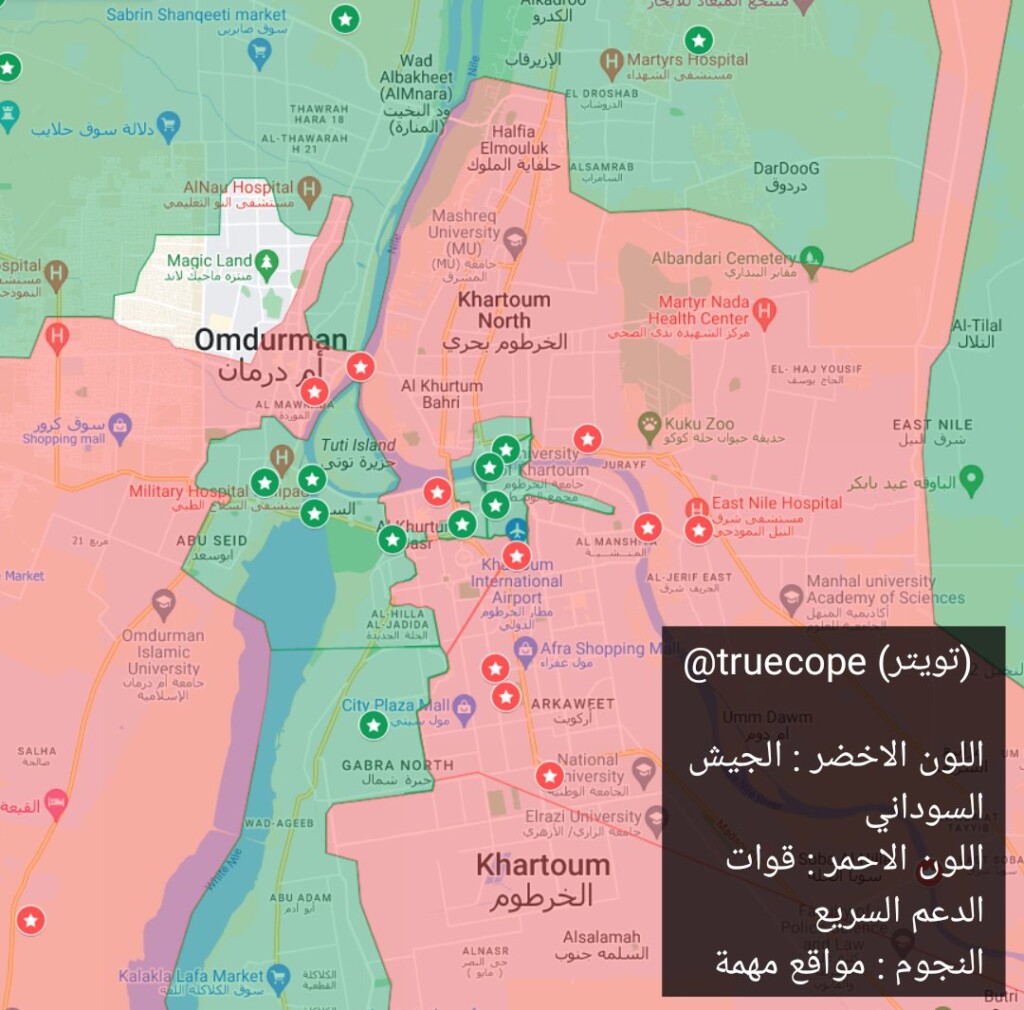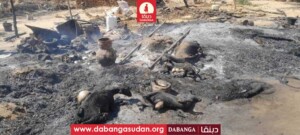Sudan capital witnesses ‘calm’ on Tuesday

Military situation in Khartoum as of noon May 23. Areas in green are under control of the SAF red of the RSF (map tweeted by @TrueCope)
KHARTOUM / OMDURMAN / KAHRTOUM BAHRI / EL OBEID –
Large parts of Khartoum witnessed a cautious calm on Tuesday, following a seven-day humanitarian ceasefire, signed by the Sudan Armed Forces (SAF) and the Rapid Support Forces (RSF) in Jeddah in Saudi Arabia on Saturday. Shooting reportedly continued in parts of Omdurman, Khartoum, and in El Obeid, capital of North Kordofan.
The truce would become effective at 21:45 Khartoum time on Monday. Yet, people living in El Obeid in North Kordofan told Radio Dabanga that they heard heavy gunfire since early Tuesday morning.
In Khartoum, clashes near the Sudan University tunnel in the centre of the city were reported as well.
In the El Mohandesin neighbourhood in Omdurman the shooting did not stop as well, Retd Ambassador Jamal Ibrahim reported. He noted that satellite monitoring of warfare in the neighbourhoods “is not always accurate”.
Other sources who spoke to Radio Dabanga reported calm in various neighbourhoods.
A woman told Radio Dabanga from East Nile in Khartoum North (Khartoum Bahri) that they had not heard any sounds of gunfire since Tuesday morning.
“Warplanes circled above the area on Monday evening and Tuesday morning, but there was no bombing,” she said. “Though we remain scared because of the many RSF soldiers present in the neighbourhoods, we are able to leave our homes and buy food with the little money left.”
The sources expressed their hope that humanitarian aid teams will be able to enter the city when the armistice will hold. Teams of volunteers have already begun to prepare for the delivery and distribution of relief items.
Journalist and political analyst Maher Abu Jokh expressed his optimism about the ceasefire signed on Saturday. He attributed the failure of the six previous truces to the lack of trust between the two parties to the conflict.
“When the ceasefire holds for the agreed seven days, it may open the way for an extension of the armistice and lead to a gradual restoration of life and services in the country,” he told Radio Dabanga.
Adel Khalafallah, spokesperson for the Socialist Arab Ba’ath Party, said that sporadic shooting was heard in some parts of Omdurman on Tuesday. “In particular since noon, people started to move around freely, and shops opened their doors again”. Traffic between Khartoum, Omdurman, and Khartoum North also resumed.
Khalafallah, however, expressed his doubts about the committee that is to monitor the ceasefire. “The committee consists of 12 members, which is by far not enough to monitor the armistice throughout the country. We trust that organised professional groups, in particular doctors and lawyers, but also individuals will report breaches of the agreement.”
Large parts of greater Khartoum witnessed bombardments and shelling on Monday morning.
Missing
The Missing People Initiative reported that 229 civilians and military personnel disappeared without a trace since the outbreak of the war on April 15.
In a press statement yesterday, the Initiative said the number is “only an indication” because of “the scarcity of information, the poor internet and communications services, and the difficulty to move around”.
By mid-May, a month after fierce fighting broke out between the SAF and RSF, at least 843,130 people were displaced inside the country. Nearly 259,000 others fled into neighbouring countries.
Another hospital closed
The Sudanese Doctors Union and the East Nile Emergency Room in East Nile have decided to close the doors of the Alban El Jadeed Hospital, “to preserve the safety of the staff and volunteers”.
In a joint statement on Tuesday, the medics said they decided to close the hospital because of “RSF members frequently entering the hospital, their shooting inside the corridors, and assaults on patients, their companions, and medical staff”.
Plundered
The President of El Ahfad University for Women, Gasem Badri, reported that the compound was subjected to vandalism and looting, “like many other facilities and institutions”.
In a statement on social media, he said that the university will seek to find ways to resume studies as soon as the situation has normalised.
He apologised for the non-disbursement of salaries to the staff, because of “the suspension of the banking system and the rest of the technical services” and pledged to solve these problems “in the shortest time”.











 and then
and then